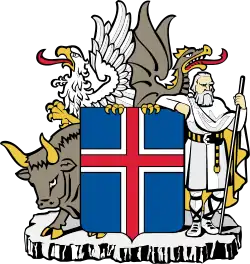 |
|---|
|
|
Parliamentary elections were held in Iceland on 10 September 1908, alongside a referendum on prohibition.[1]
Background
The Althing was dissolved by King Frederik VIII in the early spring in order to elect a new parliament that would vote on a draft status law that would define the position of Iceland in the Danish realm.[2] The election campaign was one of the acrimonious in Icelandic political history due to the controversial nature of the draft.[2] The opposition was led by Skúli Thoroddsen, a member of the Independence Party.[3]
Electoral system
The 36 members of the Althing were elected from a mix of single-member and two-member constituencies.[4] The elections were the first to take place since changes to the electoral system in 1904; they were the first to be held using the secret ballot,[5] and also saw the three-round majoritarian system replaced by plurality voting as multiple rounds of voting on the same day were no longer possible.[4] The tax qualification for voting was also reduced, increasing the proportion of people able to vote to around 14% of the population,[4] up from 7,786 in 1903 to 11,726.[6]
Results
Candidates opposed to the draft law won a landslide majority, whilst voter turnout was 72.4%, nearly 20% more than the 1903 elections.[6] As a result, the law was voted down in 1909,[2] resulting in the resignation of Minister for Iceland Hannes Hafstein.[3]
References
- ↑ Sverrir Jakobsson & Gudmundur Halfdanarson (2016) Historical Dictionary of Iceland, Rowman & Littlefield, pxxiv
- 1 2 3 Jakobsson & Halfdanarson, p54
- 1 2 Jakobsson & Halfdanarson, p223
- 1 2 3 Dieter Nohlen & Philip Stöver (2010) Elections in Europe: A data handbook, pp953–954 ISBN 978-3-8329-5609-7
- ↑ Lester B. Orfield (1953) The Growth of Scandinavian Law, The Lawbook Exchange, Ltd., p109
- 1 2 Nohlen & Stöver, p963